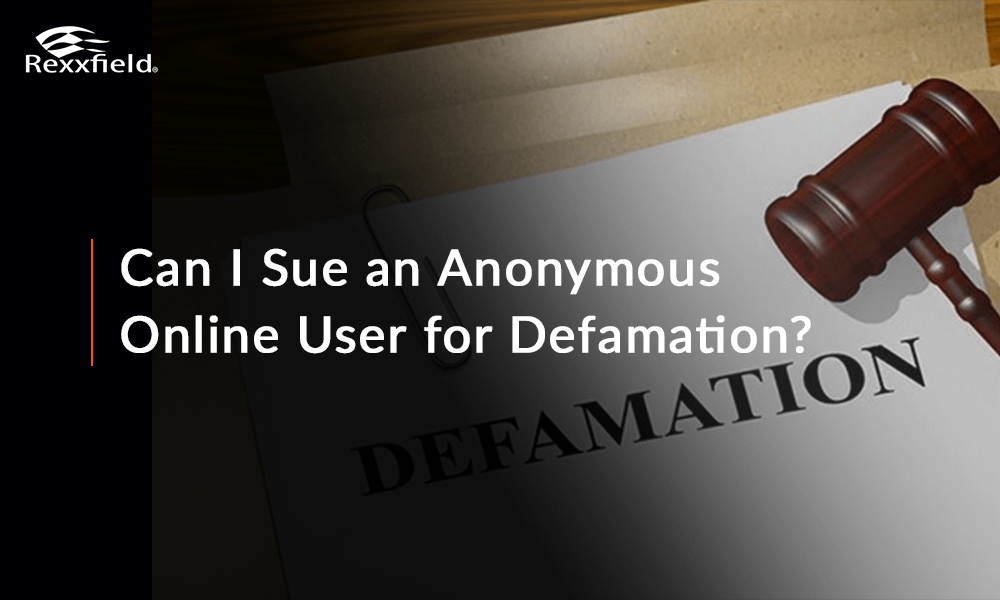Online defamation can ruin reputations and careers, especially when the person spreading lies is hiding behind a fake name or anonymous account. If that’s happening to you, you’re not out of options. Just because you don’t know who’s behind it right now doesn’t mean you can’t sue an anonymous online user for defamation.
At Rexxfield, we’ve helped people all over the world uncover anonymous users, collect digital evidence that holds up in court, and win defamation cases. In this article, we break down what actually counts as defamation, how to start a lawsuit even if you don’t know who’s responsible yet, and how our investigators can help uncover the person behind the screen.
What Qualifies as Online Defamation?
Online defamation happens when someone posts lies about you that damage your reputation. If it’s written down, like in a tweet, blog, or forum post, it’s called libel. If it’s said aloud, like in a video or voice message, that’s slander. Most of what we see online falls into the libel category.
But not every mean or critical comment counts as defamation. To legally qualify, a statement usually has to meet several criteria:
- It must be false
- It must be presented as fact, not opinion
- It must be shared with at least one other person
- It must cause measurable harm to your reputation, business, or emotional wellbeing
For example:
- False accusations of criminal activity
- Claims that damage someone’s business reputation
- Fabricated personal stories posted to smear someone’s character
Not everything mean or upsetting you see online is considered defamation. If someone posts something like, “I don’t like that company,” that’s usually seen as personal opinion, and opinions are generally protected. But if they say, “That company stole my credit card details,” without proof, that could cross the line into defamation.
Different platforms have their own reporting systems, but the basic legal rules tend to stay the same. That said, where the content is posted can impact how easily it can be removed, and whether the platform is likely to cooperate if you take legal action. Some platforms are more responsive than others.
Can You Sue Someone Who Is Anonymous?
Yes, but it’s a process. Many defamation cases begin without knowing who the attacker is. Here’s how that typically unfolds:
1. Preserve and Document the Evidence

- Timestamps
- URLs
- Usernames or handles
- Copies of direct messages, emails, or forum comments
- Any changes to the content over time
Don’t wait. Content can be deleted at any time. You can also save web pages using archive.today or Wayback Machine.
This documentation may be critical in court or when working with investigators.
More about preserving evidence can be found in our post on gathering evidence for harassment cases.
2. Identify the Anonymous User
You can’t sue someone if you don’t know who they are. But anonymous users often leave clues behind.
At Rexxfield, we use several investigative techniques to help identify anonymous users, including:
- Tracking IP addresses and device information through lawful engagement strategies and ethical social engineering
- Behavioral and linguistic analysis to compare writing styles and online habits
- Cross-platform OSINT to match usernames, bios, or recovery emails used across platforms
- Ruling in a suspect’s involvement by comparing metadata collected from the anonymous user
If these efforts narrow things down, a full subpoena may not be necessary. In many cases, we are able to confirm a suspect’s identity with strong technical evidence before a court order is required. This saves clients time, money, and avoids tipping off the anonymous user.
3. File a Lawsuit and Consider a Subpoena
Once you’ve gathered enough clues, like matching writing styles, tracking metadata, or narrowing down who might be behind the anonymous account, the next step could be taking legal action. This often means filing a civil lawsuit, even if you don’t yet know the person’s real name. It’s common to start a case as “John or Jane Doe” while continuing the investigation.
We always try to avoid subpoenas unless absolutely needed, since they can be slow and may alert the person you’re investigating. In many cases, if the evidence points clearly to one suspect, you might not need one at all. And if you do, it’s usually limited and focused, which helps reduce delays and legal costs.
But if legal action becomes necessary, a subpoena can then be issued to platforms like X (formerly Twitter), Facebook, Reddit, Google, or any ISP or hosting provider to release identifying information. These typically include:
- IP logs
- Login timestamps
- Device types
- Account recovery email addresses or phone numbers
We often help clients determine the correct jurisdiction and provider, making the subpoena process highly targeted and legally effective.
Learn more about our subpoena preparation here.
Case Study: Twitter Smear Campaign
A client came to Rexxfield after a Twitter account began spreading damaging falsehoods about her business. The posts were anonymous, but the user interacted with a structured link we provided. This revealed an IP address that matched another account used years earlier on a completely different platform.
From there, we uncovered the user’s identity and linked them to the defamation. Our report was used by the client’s attorney and submitted in court. The outcome? A legal settlement in our client’s favor.
U.S. Online Defamation Laws by State
Every state treats online defamation differently. Most require a false statement, publication to a third party, and proof of damages. Some states also require proof of actual malice for public figures.
Key examples:
- California allows discovery subpoenas for anonymous speech only if you can show your claim is likely to succeed.
- Texas offers expedited pre-suit discovery through “Rule 202” to identify anonymous parties.
- New York courts apply the Dendrite test, requiring strong evidence before compelling identity disclosure.
Here is an overview:
| State | Key Principle | Resource |
| California | Requires “prima facie” evidence before revealing identity (Krinsky v. Doe 6) | Legal Resource |
| New York | Uses Dendrite test—plaintiff must notify user and provide solid evidence | Case Text |
| Texas | Offers some protection for anonymous speech, but allows disclosures when required | Texas Statute |
| Florida & Illinois | Permit revealing identity after proof of defamation and limited defenses | IL Case Overview, FL Overview
|
Online Defamation Law Australia
In Australia, you don’t need to prove financial loss to sue someone for defamation. If your reputation has taken a hit, that alone is enough to take legal action. A landmark ruling in 2021 from the High Court in Fairfax Media v. Voller made it clear that even media outlets can be held responsible for defamatory comments posted by users on their pages. That decision changed how defamation is handled on digital platforms across the country.
Even if the person behind the defamatory content is anonymous, the law gives you a path forward. Courts can issue subpoenas that compel tech companies to reveal user information. And with government efforts like the Troll Tracker initiative helping identify anonymous offenders, it’s becoming harder for people to hide behind fake accounts and get away with it.
Read: Australian Defamation Reforms Overview
Online Defamation Laws Europe (UK and EU)

How Rexxfield Investigators Can Help
Rexxfield is not just an investigative firm—we’re pioneers in cyber investigation and digital forensics. Our evidence has been used in court cases around the world, and we tailor our reports specifically for use by law enforcement and legal teams.
Our methods include:
- Open-source intelligence (OSINT)
- Linguistic and behavioral profiling
- Proprietary metadata tracking tools
- Legal collaboration for subpoena preparation when needed
Our clients have successfully used our evidence to win court judgments, stop defamation campaigns, and hold anonymous users accountable.
Case Study: Defamation Smear Campaign on Reddit
A Rexxfield client was targeted by a smear campaign involving multiple anonymous Reddit accounts. The posts contained defamatory claims that harmed their business reputation. Using metadata analysis, behavioral profiling, and subtle interaction, we traced the activity back to a former business partner. Our findings were submitted as part of a court proceeding, which ultimately resulted in a judgment in favor of our client.
See more case studies.
Need Help Suing an Anonymous User for Defamation?
If someone is spreading false claims, harassing you online, or attacking your reputation from behind an anonymous profile, you’re not alone. These situations are frustrating, but you do have options.
At Rexxfield, our investigators specialize in tracing hidden identities and gathering strong, court-admissible evidence. We’ve helped many clients take control of their cases and secure outcomes that protect their name and peace of mind.
If you’re ready to move forward, reach out to us. The review is free and completely confidential. Let us help you uncover the truth.
Contact our investigators today for a free, confidential review.


